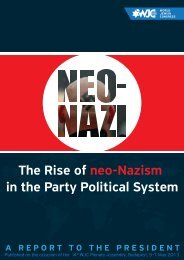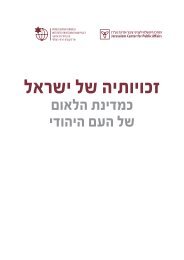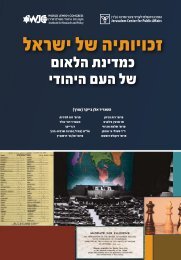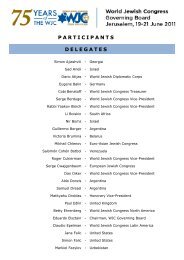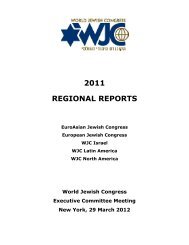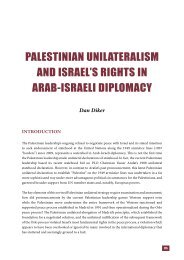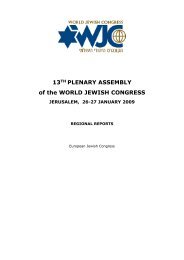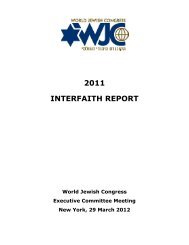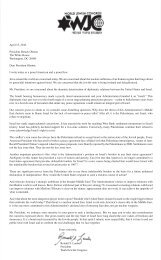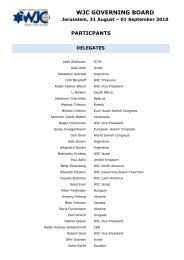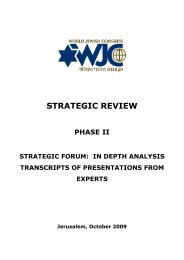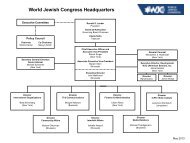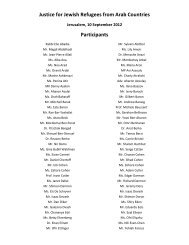Antisemitism Report 2009 - World Jewish Congress
Antisemitism Report 2009 - World Jewish Congress
Antisemitism Report 2009 - World Jewish Congress
Create successful ePaper yourself
Turn your PDF publications into a flip-book with our unique Google optimized e-Paper software.
it. It is this language which characterises the website and its material, and leads me to be<br />
satisfied that the material contained on the website has a consistent theme of the vilification<br />
of <strong>Jewish</strong> people.<br />
The Commission found that Fredrick Toben engaged in unlawful conduct and ordered that<br />
he "remove the contents of the Adelaide Institute website from the <strong>World</strong> Wide Web and not<br />
re-publish the content of that website in public elsewhere" and that he should also make a<br />
public apology to the Complainant, which he would publish on the <strong>World</strong> Wide Web, and<br />
undertake not to "publish any such material in the future".<br />
In 2001, the Executive Council of Australian Jewry applied to the Federal Court of Australia<br />
for enforcement of the orders against Fredrick Toben and the Federal Court subsequently<br />
brought down a determination which effectively upheld the findings of the HREOC<br />
commissioners.<br />
The Human Rights & Equal Opportunities Commission, on 17 September 2002, issued a<br />
media release headed "Landmark Decision on Race Hate and the Internet", which read:<br />
"In the first Australian court decision on race hate and the Internet, the Federal Court today<br />
found that a website that denied the Holocaust and vilified <strong>Jewish</strong> people was unlawful<br />
under Australia's Racial Discrimination Act 1975.<br />
Federal Court Justice Branson ordered Adelaide Institute director Fredrick Toben to remove<br />
offensive material from the <strong>World</strong> Wide Web, saying she was 'satisfied that it is more<br />
probable than not that the material would engender in <strong>Jewish</strong> Australians a sense of being<br />
treated contemptuously, disrespectfully and offensively'.<br />
She ordered Dr Toben to remove the document 'About the Adelaide Institute' and similar<br />
documents; and other material that cast doubt on the Holocaust, suggested homicidal gas<br />
chambers at Auschwitz were unlikely, that <strong>Jewish</strong> people offended by and who challenge<br />
Holocaust denial are of limited intelligence and that some <strong>Jewish</strong> people, for improper<br />
purposes, including financial gain, exaggerated the number of Jews killed during <strong>World</strong> War<br />
II and the circumstances in which they were killed.<br />
Fredrick Toben challenged the judgement, and his Appeal was heard by the Full Bench of<br />
the Federal Court in May 2003. On 27 June 2003 the Federal Court unanimously rejected<br />
Toben‘s Appeal.<br />
The judges were damning of his material, of his motives and his "sophistry". For example,<br />
Justice Carr wrote "In my view ... he was attempting what might be described as a very sick<br />
inversion and an exercise in sophistry..." and " the appellant was conscious that the reader<br />
might see its contents as being antisemitic or racist...".<br />
Fredrick Toben was ordered to remove offending material and to pay costs.<br />
Toben subsequently continued to participate in international gatherings of Holocaust deniers<br />
in the USA, in which many of the keynote speakers made overtly antisemitic comments, and<br />
also spoke at an anti-<strong>Jewish</strong> conference in Iran. Fredrick Toben and his colleague Richard<br />
Krege, participated in the Holocaust denial conference in Iran, The Australian reporting ―In<br />
his opening remarks, Dr Toben thanked the Iranian people for ―having brought forth a<br />
95



